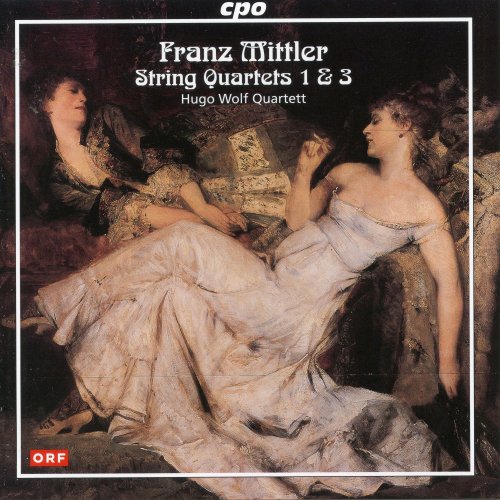
Hugo Wolf Quartett - Mittler: String Quartets Nos. 1 & 3 (2008)
BAND/ARTIST: Hugo Wolf Quartett
- Title: Mittler: String Quartets Nos. 1 & 3
- Year Of Release: 2008
- Label: CPO
- Genre: Classical
- Quality: flac lossless (tracks) +Booklet
- Total Time: 00:55:35
- Total Size: 305 mb
- WebSite: Album Preview
Tracklist
01. String Quartet No. 1 in F Major: I. Allegro
02. String Quartet No. 1 in F Major: II. Andante
03. String Quartet No. 1 in F Major: III. Scherzo. Allegro molto
04. String Quartet No. 1 in F Major: IV. Finale. Allegro
05. String Quartet No. 3 in D Minor "Aus der Wanderzeit": I. Wolhynien
06. String Quartet No. 3 in D Minor "Aus der Wanderzeit": II. Scherzo
07. String Quartet No. 3 in D Minor "Aus der Wanderzeit": III. Steiermark
08. String Quartet No. 3 in D Minor "Aus der Wanderzeit": IV. Rapsodia ungherese
Is Franz Mittler a real find or what? Humorist, pianist, accompanist, and composer, Mittler was the toast of the town in inter-war Vienna performing with tenor Leo Slezak and satirist Karl Kraus. Getting out just before the Nazis got in, Mittler left for the New World and wound up in Hollywood doing a weekly radio show and writing one-finger polkas for Groucho Marx. Long before all that, however, Mittler was something of a musical prodigy. Take the two works recorded here: his String Quartet No. 1 in F major of 1909, written Mittler was 16, and his String Quartet No. 3 in D minor of 1916, written when he was 23. Both are fresh-faced but assured sounding works, with memorable melodies attached to appealing tonal harmonies and vigorous rhythms.
As superbly performed by the Hugo Wolf Quartet, both works are well worth knowing for fans of the more conservative fin de siècle Austrian music of Schmidt and Korngold. Of the two, the F major Quartet is the more lyrical and the more expressive, with an amiability that makes it hard to resist. The more mature D minor Quartet is a sort of musical travelog commemorating the posts the composer served at during the First World War. Because those posts were spread across the Austro-Hungarian Empire, each movement is set in a specific ethnic style -- Serbian in the Scherzo and Hungarian in the finale. But whichever the quartet and whatever the style, the Hugo Wolf Quartet is totally at home with Mittler's music, finding the right balance between the humorous and the serious, the ironic and the sentimental, the demotic and the refined. With a powerful yet nuanced tone, a strong but flexible sense of tempo, and a willingness to add a little extra vibrato when the music calls for it, the young Viennese quartet is the best imaginable advocate for Mittler's music. CPO's digital sound is clear, warm, and close.
01. String Quartet No. 1 in F Major: I. Allegro
02. String Quartet No. 1 in F Major: II. Andante
03. String Quartet No. 1 in F Major: III. Scherzo. Allegro molto
04. String Quartet No. 1 in F Major: IV. Finale. Allegro
05. String Quartet No. 3 in D Minor "Aus der Wanderzeit": I. Wolhynien
06. String Quartet No. 3 in D Minor "Aus der Wanderzeit": II. Scherzo
07. String Quartet No. 3 in D Minor "Aus der Wanderzeit": III. Steiermark
08. String Quartet No. 3 in D Minor "Aus der Wanderzeit": IV. Rapsodia ungherese
Is Franz Mittler a real find or what? Humorist, pianist, accompanist, and composer, Mittler was the toast of the town in inter-war Vienna performing with tenor Leo Slezak and satirist Karl Kraus. Getting out just before the Nazis got in, Mittler left for the New World and wound up in Hollywood doing a weekly radio show and writing one-finger polkas for Groucho Marx. Long before all that, however, Mittler was something of a musical prodigy. Take the two works recorded here: his String Quartet No. 1 in F major of 1909, written Mittler was 16, and his String Quartet No. 3 in D minor of 1916, written when he was 23. Both are fresh-faced but assured sounding works, with memorable melodies attached to appealing tonal harmonies and vigorous rhythms.
As superbly performed by the Hugo Wolf Quartet, both works are well worth knowing for fans of the more conservative fin de siècle Austrian music of Schmidt and Korngold. Of the two, the F major Quartet is the more lyrical and the more expressive, with an amiability that makes it hard to resist. The more mature D minor Quartet is a sort of musical travelog commemorating the posts the composer served at during the First World War. Because those posts were spread across the Austro-Hungarian Empire, each movement is set in a specific ethnic style -- Serbian in the Scherzo and Hungarian in the finale. But whichever the quartet and whatever the style, the Hugo Wolf Quartet is totally at home with Mittler's music, finding the right balance between the humorous and the serious, the ironic and the sentimental, the demotic and the refined. With a powerful yet nuanced tone, a strong but flexible sense of tempo, and a willingness to add a little extra vibrato when the music calls for it, the young Viennese quartet is the best imaginable advocate for Mittler's music. CPO's digital sound is clear, warm, and close.
As a ISRA.CLOUD's PREMIUM member you will have the following benefits:
- Unlimited high speed downloads
- Download directly without waiting time
- Unlimited parallel downloads
- Support for download accelerators
- No advertising
- Resume broken downloads


